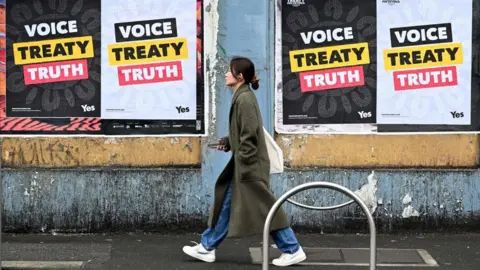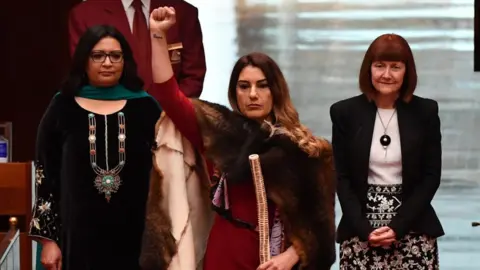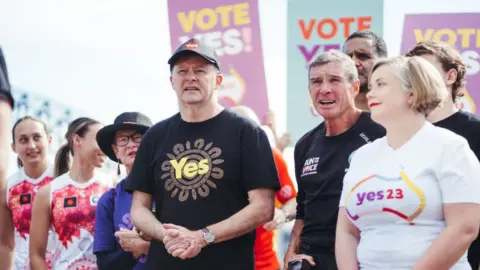Voice referendum: What is Australia's Voice to Parliament proposal?
 Getty Images
Getty ImagesAustralians have voted in a historic referendum, rejecting a reform that would have changed its constitution for the first time in almost 50 years.
If the referendum had been approved, it would have established an Aboriginal and Torres Strait Islander Voice - a formal body for Indigenous people to give advice on laws.
PM Anthony Albanese had argued that it would be a "simple" change to improve the lives of Indigenous Australians.
Constitutional referendums in Australia are rare and difficult to pass - only eight of 44 have succeeded.
And the Voice proposal was the subject of fierce debate - with both support and opposition across the political spectrum.
What is the Voice to parliament?
The Voice was recommended by a historic document in 2017 called the Uluru Statement from the Heart.
Drafted by more than 250 Indigenous leaders, the statement is considered the best - though not unanimous - call to action for reforms which affect First Nations Australians.
When announcing his plan to hold a referendum in March, Mr Albanese said the Voice would enshrine "recognition" that Australians "share this great island continent with the world's oldest continuous culture".
"Our nation's birth certificate should recognise this and be proud of it," he added.
The proposal states the Voice will "make representations" to MPs and policy makers "on matters relating to Aboriginal and Torres Strait Islander peoples".
However, if the referendum had passed, parliament would have the power to decide on the Voice's composition, functions, powers and procedures.
What's the case for it?
Indigenous Australians feel a "powerlessness" when tackling structural problems to improve their lives, the Uluru Statement says.
These problems include having a shorter life expectancy than non-Indigenous Australians, disproportionately poorer health and education outcomes, and higher incarceration rates.
Many argue this is often because of a failure to properly consult Indigenous people on solutions.
"Non-Indigenous people [are] making decisions about communities they have never visited and people they do not know," wrote Prof Megan Davis, an Uluru Statement signatory.
What do opponents say?
Some argue Indigenous people are already represented fairly in parliament. It currently has 11 Indigenous lawmakers - representing 4.8% of the parliament, a slightly higher percentage than the Indigenous Australian population nationwide.
But Voice supporters counter that MPs represent specific constituencies, not necessarily Indigenous interests.
Other critics say it could act like a third chamber of parliament and potentially veto legislation, but the government has ruled this out.
Support is not universal among Indigenous people, either. Some say a treaty with Indigenous people - a legally binding, negotiated agreement - should be the priority. Australia is the only ex-British colony without one.
 Getty Images
Getty ImagesMany Indigenous Australians emphasise they never ceded their sovereignty or land. There are fears that being recognised in the constitution could amount to that.
And others argue it's just a symbolic gesture and that money could be better spent on immediate solutions.
What will the Voice look like in practice?
That's not yet certain. If Australia had voted yes, legislation designing the Voice would have been developed and debated.
One proposal had suggested the advisory body could have 24 members - comprised of representatives from each state and territory, the Torres Strait Islands, and remote Aboriginal communities.
Mr Albanese still sees the Voice being "an unflinching source of advice and accountability".
Are there global comparisons?
Voice advocates compare it to the First Nations parliaments in Norway, Sweden and Finland for the Sami people.
They're not parliaments in the traditional sense - they are mostly consultative bodies which do not have a formal legislative function.
In Finland, for example, the government negotiates with the Sami Parliament on specific matters like land management and legislative or administrative changes affecting Sami culture.
However, Finnish laws don't prevent government authorities from forging ahead without negotiations.
Why is a referendum needed?
Advocates say the Voice needs to be enshrined in the constitution rather than legislated. Such a change cannot happen without a referendum.
They argue this would give the Voice permanency, insulating it from partisan politics.
The referendum would have succeeded if a majority of Australians voted yes, and received majority support in at least four of Australia's six states.
Polling had previously indicated about three quarters of Australians supported a constitutionally enshrined Voice - but dropped since the debate began in earnest.
 Getty Images
Getty ImagesBut the last successful referendum was in 1977, and none have passed without bipartisan support.
In this vote, Australia's main opposition coalition campaigned against the change.
The Greens party supported the Voice. But its previous Indigenous Affairs spokesperson, Lidia Thorpe, left the party over its position - she is advocating for a treaty first.
What next?
In a live address following the referendum result, Mr Albanese called for a new way forward, saying: "Tomorrow we must seek a new way forward with the same optimism."
He said that as prime minister, he will accept the responsibility for the decisions he took, but that he still believes that calling the referendum was the right thing to do.
"We argued for this change not out of convenience but out of conviction," he said.
"This moment of disagreement does not define or divide us. We are not Yes or No voters, we are all Australians, and it is as Australians together that we must take our country beyond this debate," he added.
Mr Albanese had previously indicated a referendum on the issue is likely if he wins a second term in 2025.
Additional reporting by Tom Housden
